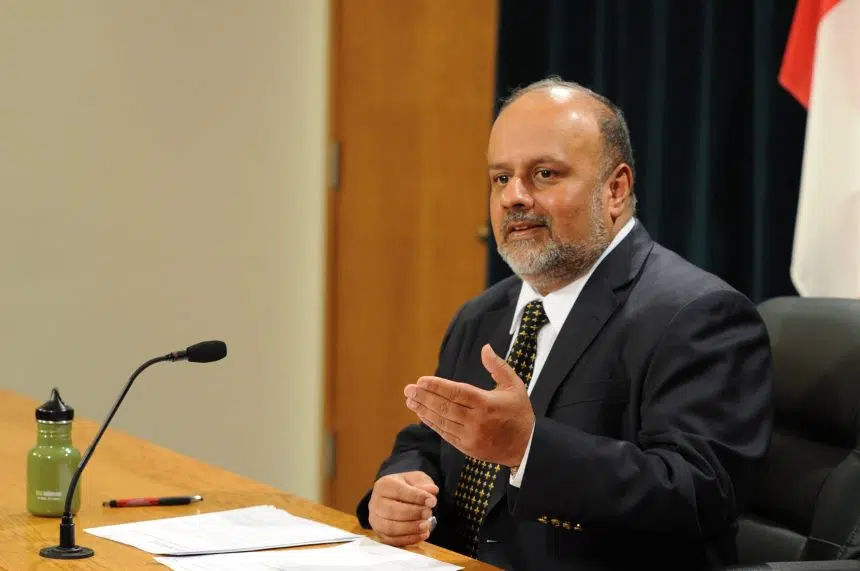A snowmobile rally in mid-March is at the heart of Saskatchewan’s largest single-day increase in COVID-19 cases.
The Government of Saskatchewan announced Saturday that there were 30 new cases in the province, bringing the total to date to 134. The previous single-day high in the province was 18, which was announced March 21.
Of the 134 cases, 18 have been traced back to a snowmobile rally and dinner in Christopher Lake on March 14.
“This really demonstrates why we have been reducing the size of gatherings in Saskatchewan and why we really emphasize that, while we love celebrating and getting together in Saskatchewan, this is not the time,” Dr. Saqib Shahab, Saskatchewan’s chief medical health officer, said during a media conference Saturday.
“This is the time for social distancing. This is the time to remain connected through other means but really not get together as groups to have a meal or share a meal or have events where you are closer than two metres (apart from another person).”
Dr. Khami Chokani, a medical health officer with the Saskatchewan Health Authority, said there were around 250 people at the rally and 110 at the dinner.
One person who was in attendance tested positive this past Wednesday, prompting interviews with that person and other individuals who may have been in contact with the person. More work is required.
“We do not have a comprehensive list and that was why, when we did identify the positive case on the afternoon of the 25th, we managed to at least get some initial contacts,” said Chokani, who said health officials have been in touch with 76 people so far.
“That is the importance of contact tracing and doing it in a timely manner and it’s important for people who did attend the rally supper to call and let us know because we need to fill in the gaps.”
Chokani said three others who already were symptomatic attended the rally and subsequently tested positive.
He added that everyone who attended the supper should have self-isolated for 14 days from the date of the rally; that period expires Saturday. Any of those people who have been experiencing symptoms should call HealthLine to be assessed.
The rally is the third large event that has caused positive tests in Saskatchewan, joining a dental conference in Vancouver (three cases) and a curling bonspiel in Edmonton (11). Shahab stressed that people shouldn’t assign blame to event organizers, saying: “No one wants people to come to an event and get sick.”
The rest of the numbers
At least seven of the 134 cases are the result of local transmission, up one since Friday. The rest are travel-related or the result of exposure at mass gatherings.
Six people are in hospital, including three in intensive care. The number of ICU cases increased by one since Friday.
Regina, Saskatoon and central Saskatchewan each have one ICU case.
There is one acute care case in the north, one in Saskatoon and one in Regina.
The age breakdown includes 58 cases between the ages of 20 and 44, 49 cases in the 45-64 range, 22 cases over the age of 65, and five cases aged 19 and under.
Four people had been declared recovered, up one since Friday.
“It’s important to recognize that most cases are mild and many we anticipate will have a full recovery after two to three weeks of symptom onset,” Shahab said.
He once again stressed the importance of hand-washing, keeping gatherings to a maximum of 10 people with two metres between each person, and self-isolating for 14 days after returning from travel.
The government said 8,248 tests have been done at the Roy Romanow Provincial Laboratory. According to the province, Saskatchewan now ranks third in the country for travel- and non-travel-related testing behind Alberta and B.C.
The Ministry of Health also is sending additional staff to the Saskatchewan Health Authority to help with contact tracing.
Shahab didn’t know how many staff members would be given that task, but he noted that public health agencies and others have done a good job of keeping up with contact tracing to date. As case numbers continue to rise, however, more people will be required to do the interviews required for contact tracing.
People using remote option
The government revealed Saskatchewan physicians did more than 25,000 telephone assessments in the first 10 days since that plan was put in place March 13.
Doctors are able to provide advice to patients from a remote location to continue the practice of physical distancing.
HealthLine 811 and the government’s online assessment tool also are options for people concerned they might have COVID-19.











